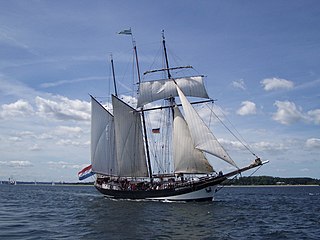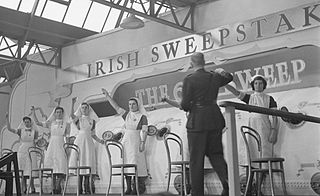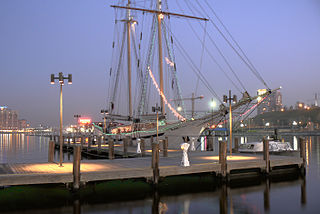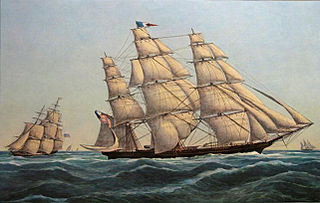
A schooner is a type of sailing vessel defined by its rig: fore-and-aft rigged on all of two or more masts and, in the case of a two-masted schooner, the foremast generally being shorter than the mainmast. A common variant, the topsail schooner also has a square topsail on the foremast, to which may be added a topgallant. Differing definitions leave uncertain whether the addition of a fore course would make such a vessel a brigantine. Many schooners are gaff-rigged, but other examples include Bermuda rig and the staysail schooner.
The Golden State is a nickname for the U.S. state of California.

A sweepstake is a type of contest where a prize or prizes may be awarded to a winner or winners. Sweepstakes began as a form of lottery that were tied to products sold. In response, the FCC and FTC refined U.S. broadcasting laws. Under these laws sweepstakes became strictly "No purchase necessary to enter or win" and "A purchase will not increase your chances of winning", especially since many sweepstakes companies skirted the law by stating only "no purchase necessary to enter", removing the consideration to stop abuse of sweepstakes. Today, sweepstakes in the United States are used as marketing promotions to reward existing consumers and to draw attention to a product. By definition, the winner is determined by pure random chance rather than skill.

The Irish Hospitals' Sweepstake was a lottery established in the Irish Free State in 1930 as the Irish Free State Hospitals' Sweepstake to finance hospitals. It is generally referred to as the Irish Sweepstake or Irish Sweepstakes, frequently abbreviated to Irish Sweep or Irish Sweeps. The Public Charitable Hospitals Act, 1930 was the act that established the lottery; as this act expired in 1934, in accordance with its terms, the Public Hospitals Acts were the legislative basis for the scheme thereafter.

A Baltimore Clipper is a fast sailing ship historically built on the mid-Atlantic seaboard of the United States of America, especially at the port of Baltimore, Maryland. An early form of clipper, the name is most commonly applied to two-masted schooners and brigantines. These vessels may also be referred to as Baltimore Flyers.

The pungy is a type of schooner developed in and peculiar to the Chesapeake Bay region. The name is believed to derive from the Pungoteague region of Accomack County, Virginia, where the design was developed in the 1840s and 1850s.

Clipper City is a modern replica of a nineteenth-century cargo schooner.

For other ships of this name, see Sweepstake (disambiguation)

The N.B. Palmer was a clipper ship owned by A.A. Low & Brother which was active in the China trade.

Sweepstakes was an 1853 clipper ship in the California trade. She was known for a record passage from New York to Bombay, and for a race around the Horn with three other clippers.
The schooner Anglona was the first American opium clipper. She sailed in the Chinese coastal trade in the 1840s, and had a famous race with the schooner Ariel around Lintin Island.
Carrier Dove was the name of several ships:
Lounger was a British Thoroughbred racehorse best known for winning the classic St Leger Stakes in 1797. Bred and initially trained in Yorkshire he won his last three races as a three-year-old including the St Leger at Doncaster Racecourse. He won a further five races as a four-year-old before being sold and transferred to the south of England where he raced with disappointing results in 1799. He does not appear to have had a stud career.
Omaze is an American for-profit fundraising company which partners with charities in fundraising events. Omaze's events feature prizes, such as material goods, property, or celebrity experiences, usually with one grand prize and several lesser prizes. In order to enter the draw for the prizes, financial contributions are encouraged, with 15% to 60% of the money going to the partner charity.
Many vessels have been named Comet, after the astronomical object comet.

Sweepstake Annie is a 1935 American comedy film directed by William Nigh and starring Tom Brown, Marian Nixon and Wera Engels.
GeneSweep or Gene Sweepstake was a sweepstake and scientific wager for scientists to bet on the total number of genes in the human genome. The sweepstake was started at a Cold Spring Harbor Laboratory conference in 2000. Initially, bets could be placed for $1, which was raised to $5 in 2001 and to $20 in 2002. The cost of placing a bet increased significantly because later participants were expected to have much more accurate information available to inform their guesses. By May 23, 2000, 228 bets had been placed, with the average number of predicted genes among them being 62,598.
This page is based on this
Wikipedia article Text is available under the
CC BY-SA 4.0 license; additional terms may apply.
Images, videos and audio are available under their respective licenses.








